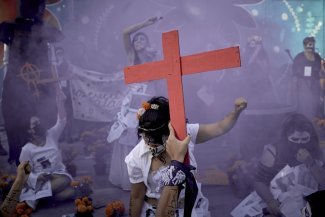Bill Gates, prime ministers, chief executives of international companies and bankers attend it. The glittering World Economic Forum at Davos in Switzerland is about power and wealth. It is a forum for the 1%.
But what about the other 99%?
The World Social Forum, starting today in Tunis, is also about power and wealth, but it is about the power of the people and the wealth of the planet. It is the forum for the other 99%.
At the World Social Forum you find migrants discussing tactics to fight for free movement, and trade unionists discussing the battle against austerity.
You find people planning action: against mining companies and ‘agribusinesses’; against ‘fracking’; for community radio; for women’s rights and much else.
People from all over the world discuss whether ‘another world is possible’ – and how we get there.
This year it is being held – appropriately – in Tunisia, the spark which started the ‘Arab Spring’.
The successes and difficulties of the Tunisian revolution are a key part of this World Social Forum, and Tunisian organisations form the organising committee.
Tunisians, proud of their revolution, stress some basic facts for revolutionaries and activists: “…The [Tunisian] people have made the revolution for social reasons, for economic reasons, to make their situation better…,” said Abderrahmane Hedhili , the president of the Tunisian Forum for Social and Economic Rights, part of the Forum’s committee.
There was once a time when people thought greed was bad, where ‘the market’ was not the answer to everything, and where money could not be sent around the world in a second to make more money for the super rich.
Then in the 1980s and 1990s, neoliberalism and markets took over the world; the world became ‘global’. This kind of globalisation appeared just to make the rich and powerful even more so.
People fought the power of global markets, which was destroying lives – from the Zapatistas in Mexico fighting for rights of Mexican Indians, to the miners’ strike in the UK in the 1980s, fighting to stop miners being thrown on the scrap heap; from environmentalists fighting to protect the planet to the huge anti World Trade Organisation action in Seattle in 1999.
People were fighting against globalisation – or maybe for a different vision of what globalisation should be.
The 99% needed a global forum themselves, like the one for the 1% at Davos in Switzerland.
Ten thousand people attended the first World Social Forum in Porto Alegre, Brazil, in 2001. There have since been ten - in Brazil, India, Mali, Pakistan, Venezuela, and Senegal. The last in Dakar in Senegal had 50,000 attendees. This year in Tunisia they plan for 70,000.
There is no final statement, no hierarchy making decisions.
The World Social Forum works, in the words of its Charter, by “reflective thinking, democratic debate of ideas, formulation of proposals, free exchange of experiences and interlinking for effective action….”
So no one ‘speaks’ for the World Social Forum; instead there are hundreds of workshops, discussion and debates.
It is an open space for a “permanent process of seeking and building alternatives”. This year the organisers say there will be over 1,500 workshops and debates.
This year is crucial: the world faces profound economic, social and environmental problems. Resistance to the answers of the 1% grows across the world. The World Social Forum is one way to work out answers for a new world. “Another world is possible” – and necessary.










